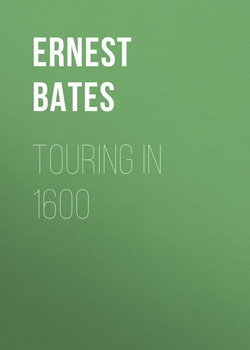Touring in 1600

Реклама. ООО «ЛитРес», ИНН: 7719571260.
Оглавление
Bates Ernest Stuart. Touring in 1600
CHAPTER I. SOME OF THE TOURISTS
CHAPTER II. GUIDE-BOOKS AND GUIDES
CHAPTER III. ON THE WATER
CHAPTER IV. CHRISTIAN EUROPE
PART I. EUROPEAN EUROPE
PART II. THE UNVISITED NORTH
PART III. THE MISUNDERSTOOD WEST
CHAPTER V. MOHAMMEDAN EUROPE
PART I. THE GRAND SIGNOR
PART II. JERUSALEM AND THE WAY THITHER
CHAPTER VI. INNS
CHAPTER VII. ON THE ROAD
CHAPTER VIII. THE PURSE
BIBLIOGRAPHY
Отрывок из книги
From what has been said already, two conclusions may be drawn: first, that the Average Tourist was given much advice; secondly, that he did not take it. Let us too, then, see the theory for one chapter only; and, in all chapters after, the practice.
It must have amused many a youngster to hear the down-trodden old gentleman, whom his father had hired, setting forth how the said youngster must behave in wicked Italy if he was to grow up in favour with God and man; all the more so if the old gentleman, whose name, perhaps, was the local equivalent for John Smith, published his advice in Latin under a Latin pseudonym, say, Gruberus or Plotius. Gruberus and Plotius suggest themselves because they are the very guidiest of guide-book writers. They, like all the orthodox of their kind, begin by a solemn argument for and against travelling. They bring up to support them a most miscellaneous host: the Prophets, the Apostles, Daedalus, Ulysses, the Queen of Sheba, Theseus, Anacharsis, the "Church of Christ," Pythagoras, Plato, Abraham, Aristotle, Apollonius of Tyana, Euclid, Zamolxis, Lycurgus, Naomi, Cicero, Galen, Dioscorides, him who travelled from farthest Spain to see Livy ("and immediately," as some one most unkindly says, "immediately he saw him, went away"); Solon also and St. Paul, and Mithridates, the Roman Decemviri, Diodorus Siculus, Strabo, Pausanias, Cluverius, Moses, Orpheus, Draco, Minos, Rhadamanthus, Æsculapius, Hippocrates, Avicenna, the physicians of Egypt and the gods of Greece. But there is not a word about Jonah; perhaps his luck and experiences were considered abnormal; or perhaps because, as Howell says, "he travelled much, but saw little."
.....
While we are on this subject we may stop to sympathise with awkward misunderstandings like that of the Jesuit Possevino at Moscow, when invited to (Orthodox) Mass ("obednia") with intent to compromise him; he went, thinking it was dinner ("obed") to which he had been asked. Then there are those, too, whose efforts were hopelessly below even this standard, such as Alonzo de Guzman, who suffered hunger in Germany because he only knew Spanish, and was put on the road to Bologna when he wanted to get to Cologne; or the Englishman who was trying to find that same road and went along staggering the peasantry with the question, "Her ist das der raight stroze auf balnea?" the peasantry replying by signs that he interpreted as directions, but the road led him further than ever from Baden. To which class belonged a certain friend of Josias Bodley, younger brother of the founder of the Bodleian library and author of by far the liveliest account of a tour at this period,20 will never be known, but that is no reason why the tale should not be re-told. "Not long ago I was in company with some boon companions who were drinking healths in usquebagh, when one was present who wished to appear more abstemious than the rest and would not drink with them, to whom one of them, who could not speak Latin as well as I do, said these words, 'Si tu es plus sapientis quam nos sumus, tu es plus beholden to God Almighty quam nos sumus.'" And finally there are those who find themselves reduced to sign-language, such as the Roman Catholics who found a sumptuous dinner awaiting them at a Protestant inn on a fast-day, when, to add to the trial of refusing it, was the apparent impossibility of making their wants understood, until one of their number, a priest, by the way, imitated a hen's cackle and "laid" a piece of white paper the shape and size of an egg!
While conversation-dictionaries existed which claimed to be useful their claim has no other basis than that of their own prefaces; the tourists do not own to indebtedness to them. But taking it for granted that primary needs must be served by persons, not books, for further acquirements Moryson recommends the romance of "Amadis de Gaule" which was being read by every one in his own tongue. Probably the conversation-books are of more use now than at the time of their publication, from the light they occasionally throw on customs, and, through their phoneticism, on pronunciation. Yet the tourists' own evidence as to this is more valuable, as being more authentic, when an Englishman writes "Landtaye" for "Landtage" and "Bawre" for "Bauer." As for sixteenth-century maps, they seem meant for gifts rather to an enemy than to a friend. In every department, then, the tourist had recourse to persons.
.....